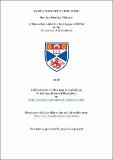Files in this item
Kant's concept of the good
Item metadata
| dc.contributor.advisor | Timmermann, Jens | |
| dc.contributor.author | Tonissen, Bas Ben Martien | |
| dc.contributor.author | Snedegar, Justin | |
| dc.coverage.spatial | 97 p. | en_US |
| dc.date.accessioned | 2018-07-18T16:32:23Z | |
| dc.date.available | 2018-07-18T16:32:23Z | |
| dc.date.issued | 2018 | |
| dc.identifier.uri | https://hdl.handle.net/10023/15554 | |
| dc.description.abstract | This dissertation asks what Kant means when he talks about the good, and what role this concept plays in his ethical theory. It is divided into three chapters. The first examines the context in which this question was first asked, namely in a review of Kant’s ‘Groundwork’ by H. A. Pistorius. I analyse this review and Kant’s direct response to it in his ‘Critique of Practical Reason’, where he clarifies that the good is the “necessary object of the faculty of desire” and that it can only be determined “after and by means of” the moral law. I argue that traditional law-first and good-first readings of these passages both fail, and that instead we should prefer Stephen Engstrom’s reading which takes the food as an a priori concept of practical reason, whose content is determined by the moral law. The remaining chapters investigate this view, and specifically the strong guise of the good thesis to which it commits Kant. In the second I clarify the guise of the good and the specific version of it to which Engstrom’s view is committed, which is one that holds all willing to aim at satisfying a condition of universal validity. I argue that self-conceit and despondency are two notions from Kant’s psychology which provide a model for how non-moral willing can aim at universal validity. In the third chapter, I use this general framework to try and explain specific cases of non-moral willing. Ii find that the framework can adequately explain away diabolical willing as mere evil willing. It can also deal with frailty, though this requires departure from Engstrom’s and Reath’s views and the introduction of ‘persistent illusion’. It has the same trouble dealing with listlessness that all Kantian views do. I conclude that Engstrom’s view of the good is viable. | en_US |
| dc.language.iso | en | en_US |
| dc.publisher | University of St Andrews | |
| dc.subject.lcc | B2799.G65T7 | |
| dc.subject.lcsh | Kant, Immanuel, 1724-1804 | |
| dc.subject.lcsh | Good and evil | |
| dc.title | Kant's concept of the good | en_US |
| dc.type | Thesis | en_US |
| dc.type.qualificationlevel | Masters | en_US |
| dc.type.qualificationname | MPhil Master of Philosophy | en_US |
| dc.publisher.institution | The University of St Andrews | en_US |
This item appears in the following Collection(s)
Items in the St Andrews Research Repository are protected by copyright, with all rights reserved, unless otherwise indicated.

